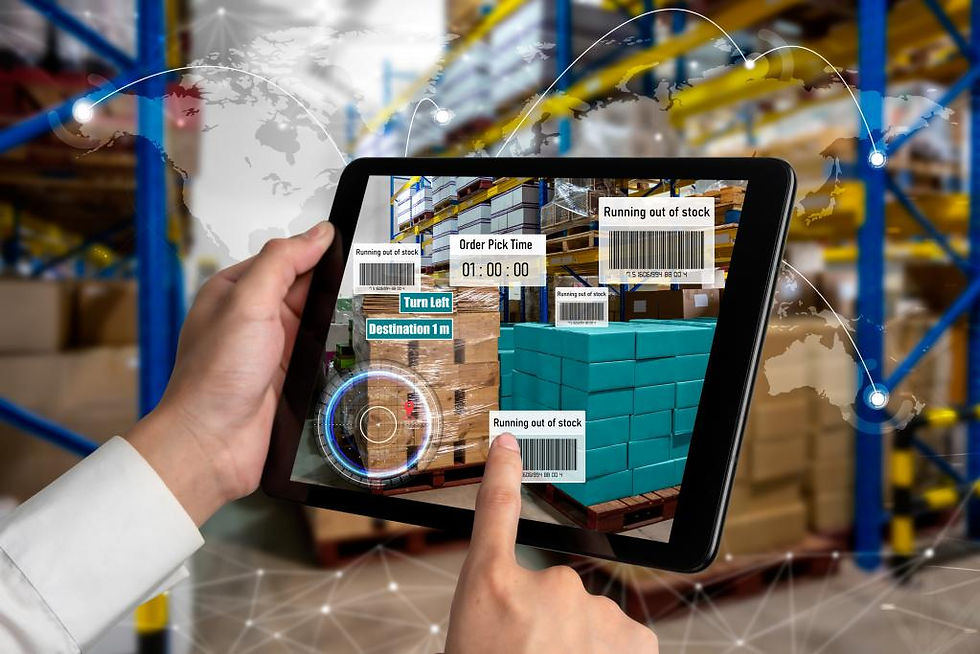Why SMEs and Enterprises Need Supply Chain Automation
- Cinnex Resources

- Feb 12, 2025
- 4 min read
Updated: Feb 20, 2025

The complexity of managing inventory, orders, shipping, and customer demands has become increasingly challenging. Businesses of all sizes are turning to supply chain automation as a key solution to simplify operations, increase efficiency, and reduce costs. Automation in the supply chain isn't just a trend—it's a critical strategy for staying competitive and ensuring long-term growth.
Supply chain automation refers to the use of technology to automate manual processes within the supply chain, such as inventory management, order processing, and shipping. This can be achieved through various tools, including Enterprise Resource Planning (ERP) systems, AI-powered solutions, robotics, and advanced data analytics. The goal is to eliminate inefficiencies, reduce human error, and create a more agile, cost-effective supply chain.
For SMEs, the ability to scale without compromising efficiency is essential. With limited resources, these businesses often face significant barriers in managing their supply chain effectively. Manual processes can create bottlenecks that hinder growth, leading to missed opportunities and increased operational costs. Supply chain automation helps level the playing field by enabling SMEs to compete with larger businesses that have access to more resources and technology.
On the other hand, enterprises, with their extensive and often global supply chains, face a unique set of challenges. Managing larger volumes of data, ensuring compliance across multiple regions, and maintaining supply chain efficiency at scale requires a high level of precision and agility. Supply chain automation provides enterprises with the tools needed to optimize these complex processes, reduce human error, and improve overall operational efficiency.
Across both SMEs and enterprises, supply chain automation offers a powerful way to enhance performance and drive business success. By integrating automated solutions into their supply chains, businesses can gain better control over their operations, improve decision-making, and ultimately provide a better customer experience. Whether you are managing a small business or a global enterprise, supply chain automation it’s a necessity for staying ahead in a rapidly evolving market.
How Automation Benefits SMEs
Many SMEs still rely on manual processes for inventory tracking, order fulfillment, and shipping, leading to inaccuracies and longer lead times. For SMEs, supply chain management is often a daunting task. Many small business owners juggle multiple responsibilities and the complexity of coordinating suppliers, distributors, and inventory can become overwhelming. Other than that, SMEs often lack the financial and human resources that larger enterprises have. As a result, operations can become siloed, inefficient, and prone to delays or errors. As SMEs grow, the complexity of supply chain management increases. Without supply chain automation, it becomes harder to keep up with increasing demands and scale operations effectively.
Supply chain automation can help SMEs overcome these challenges by providing a range of advantages. By automating routine tasks such as inventory management and order processing, SMEs can free up valuable time for their staff to focus on more strategic activities. Automation ensures tasks are completed faster and more accurately, reducing the chances of human error. One of the main reasons SMEs should consider automation is the potential for significant cost savings. Automated processes can help businesses reduce labor costs, minimize inventory holding costs, and eliminate costly mistakes that may arise from manual processes.
Supply chain automation provides real-time insights into inventory levels, order statuses, and delivery schedules. This increased visibility helps SMEs make better-informed decisions, improve forecasting accuracy, and respond more quickly to market changes. As your business grows, supply chain automation allows you to scale operations without needing to increase your workforce or manually manage larger volumes of orders and inventory. This ensures that your supply chain remains efficient and effective as your business expands.
Why Enterprises Need Supply Chain Automation
Enterprises, on the other hand, face different but equally pressing challenges in supply chain management. These challenges include managing larger volumes of data, optimizing global logistics, and ensuring compliance across various regions. For enterprises, efficiency is paramount. Supply chain automation speeds up processes such as procurement, production scheduling, and inventory tracking. This ensures smoother operations and faster response times to customer demands, ultimately leading to improved customer satisfaction.
Large enterprises often have extensive supply chains with complex logistics. By automating key processes, businesses can significantly reduce operational costs, including labor, transportation, and warehousing expenses. Supply chain automation allows companies to optimize these functions, making their supply chains more cost-effective. The larger the business, the more difficult it becomes to maintain accurate data across the entire supply chain. Supply chain automation ensures that data is captured accurately and consistently, reducing the risk of errors that could lead to costly disruptions, such as inventory stockouts or overstocking.
Enterprises often deal with multiple suppliers and customers across various countries, each with its own regulations and standards. Supply chain automation helps ensure compliance with local and international laws by managing documentation, customs clearance, and regulatory requirements efficiently. Automation in supply chains is typically powered by advanced analytics and AI. This technology helps enterprises analyze vast amounts of data to uncover trends, identify inefficiencies, and predict demand. These insights lead to more informed decision-making and help businesses stay ahead of the competition.
The Role of ERP and AI in Supply Chain Automation
Enterprise Resource Planning (ERP) systems and AI play a crucial role in supply chain automation. ERPs provide businesses with a centralized platform for managing various supply chain functions, such as procurement, inventory management, and order processing. With an ERP system in place, businesses can automate many manual tasks and gain a unified view of their operations.
AI takes supply chain automation to the next level by enabling predictive analytics, intelligent decision-making, and optimization. AI algorithms analyze historical data and forecast demand patterns, helping businesses optimize their inventory levels and supply chain processes.
For SMEs, the path to business growth and efficiency lies in adopting supply chain automation. For enterprises, the need to stay competitive and reduce operational costs demands the integration of automated solutions. Regardless of company size, automation enhances supply chain performance, drives profitability, and ensures sustainability.
If you’re ready to take the leap into supply chain automation, Cinnex can help. As a leader in ERP automation, Cinnex offers innovative solutions that can help simplify your supply chain processes, enhance efficiency, and drive business growth. Take the first step toward smarter supply chain automation, contact us now at https://www.cinnex.co/contact-us to explore the right solutions for your business.




Comments